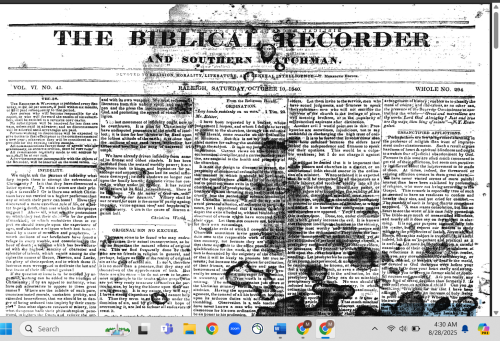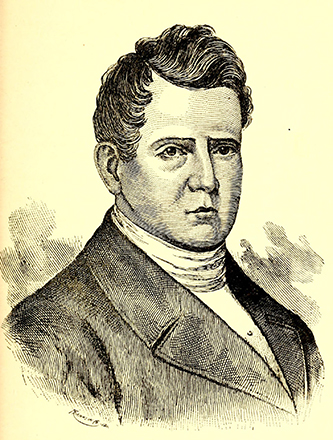
The Baptist State Convention of North Carolina was organized in 1830; among its founders were the future first president of Wake Forest College Samuel Wait and Thomas Meredith, the first editor of the Biblical Recorder, the convention’s voice in print since 1835. For 190 years now, the Biblical beliefs, church practices, and struggles of the tie that binds most North Carolina Baptist churches have played out on its printed pages. In 1840, it also revealed a growing rift within the fairly young United States of America that was mirrored in the American Baptist Convention. The American Civil War would not erupt for another two decades but the signs of its coming were clearly on display in the early editions of the Biblical Recorder held in the Wake Forest University Special Collections.
While the seeds of the division between northern and southern states went back to the writing of the nation’s Constitution when the issue of slavery was pushed down the road, the moral debate had not diminished. In 1824, that document’s author and former President Thomas Jefferson compared the issue of slavery to the dilemma of having a wolf by the ear and the dangerous choice of either holding on or letting go; Thomas Jefferson was a slave owner in Virginia.
So it is not surprising that the abolition movement became an early and increasingly frequent topic in the newly circulating Biblical Recorder. Simple articles on the Abolition movement evolved into a debate between northern theologians and southern pastors in letters to the editor and responses. In a February 2, 1836 editorial, the question was posed “Is the holding of slaves a sin against God?” and the answer was “Yes…But…” The financial impact of freeing the slaves was too big a consideration to be dismissed. Biblical Recorder editor Thomas Meredith continued to print informative reports from the American Anti- Slavery Society and stories on William Wilberforce as well as religious instruction of slaves but also supported the right and economic necessity to own slaves in the South. Meredith was a northerner by birth and upbringing in Doylestown, Pennsylvania but came to North Carolina as a missionary, married a southern girl named Georgia and pastored several churches in North Carolina. Thomas Meredith was also a slave owner, something he never revealed in his writings or newspaper.
In the October 10, 1840 edition of the Biblical Recorder, Reverend Jesse Hartwell wrote a particularly significant letter where he raised the question whether it would be advantageous to create a separate Southern Baptist Convention due to the current distrust by southerners of northerners over the issue of slavery. (The idea of schism had almost certainly been discussed in church foyers but, this is a significant early mention of the concept in print.) Hartwell stated (and the Biblical Recorder printed) “It is necessary that something should be done to remove the spirit of distrust from southern minds, which has been, whether justly or unjustly, roused by the conduct of northerners.” Trust and fellowship had been broken between the brethren. Furthermore, the abolitionists were blamed as those who “have put an end of union of effort in the cause of religion” referring to jointly supported missions.
The Southern Baptist Convention would be created five years later in 1845, in another state, but the dye (or ink) had been cast for North Carolina Baptists. Readership of the Biblical Recorder was greatly expanding in the 1840s as churches distributed the weekly newspaper to its congregants. For many, in an era when literacy was rapidly increasing and especially in the remote western portion of the state, this may well have been the only newspaper residents had easy access to and were getting their information from a trusted source.

Thomas Meredith, the sole editor of the Biblical Recorder since its conception, had also written the North Carolina State Baptist Convention’s constitution as well as served as its president and Chairman of the Board of Wake Forest College so he was an influential voice in the state. He pushed for a college for women and many years later Meredith College would honor that impetus. However Meredith died prematurely in 1850, on the eve of the advent of widespread photography with which he was so fascinated (and included an article in the BR about the advancing technology) but without his image ever being captured by a camera. He also never saw the Civil War and the Emancipation of slaves.
In these old, water stained pages of the Biblical Recorder that Meredith laid out in type lie seeds of the coming national civil war and the origins of a church division, resulting in the creation of the Southern Baptist Convention, today the largest religious denomination in the United States.
Both the Baptists and the United States would soon be officially divided but they did not yet know that in the fall of 1840, when church leaders walked home with a fresh copy of the Biblical Recorder tucked under their arms, for Sunday dinner prepared by their slaves. Small boys later that evening had The Biblical Recorder read to them by firelight, boys who would grow up to don Confederate uniforms and fight for a cause already dying.

7 Comments on ‘The Biblical Recorder and an Origins Story’
Thank you, Marcia, we really appreciate all your Baptist historical expertise!
This is such fascinating history! Thanks for writing it up!!
It’s so interesting to see contemporary commentary on big controversies like this when we now know how the story ends. Thanks for sharing this peek into the origins of the SBC!
Marcia, you always do such a great job at making history accessible for today’s audience. Thank you for sharing!
So interesting! Thanks for synthesizing these historical documents to share such a fascinating part of NC history.
Congratulations for this important and valuable report.
Thank you for you work on this! I always enjoy listening to your discoveries in these collections.